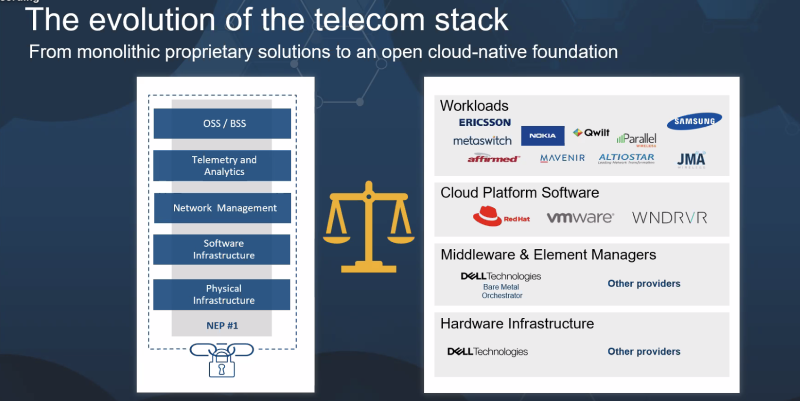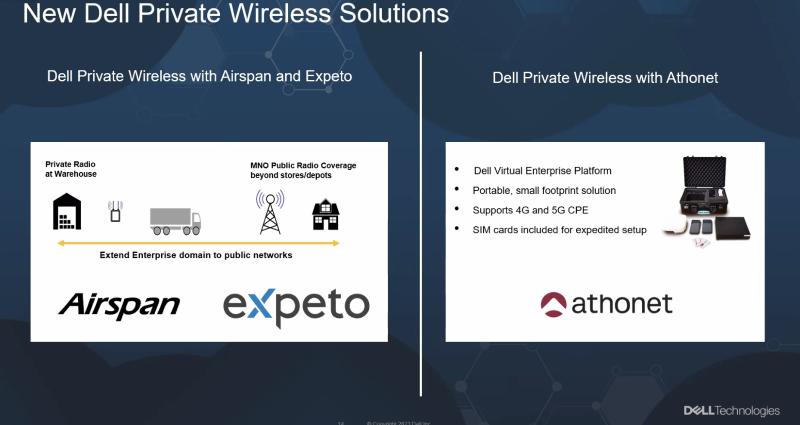Last year, Dell Technologies introduced what it calls “infrastructure blocks.” These are software modules that come pre-installed on Dell servers to provide telcos with everything they need to establish their own cloud infrastructure. This week, Dell announced that Red Hat joined its infrastructure blocks program. Red Hat’s software will now be one of three options that customers can choose for the cloud platform software layer of their stack.
In September 2022 when Dell first introduced its infrastructure blocks, Fierce Wireless pointed out that pre-installing software on Dell servers seemed counterintuitive to the whole movement to disaggregate hardware from software.
At the time, Dennis Hoffman, SVP and general manager of Dell Technologies Telecom Systems Business, said the industry had swerved from “guardrail to guardrail.” He said the disaggregation movement came because people were tired of vendor lock-in where everything was on one “God box” and they had no choice. But recently, the pendulum had swung too far in the opposite direction, and companies were finding it too difficult to take a variety of open-source software and make it all work on off-the-shelf hardware.
Dell is trying to find a middle ground by offering “a practical level of openness,” said Andrew Vaz, VP of product management with Dell’s Telecom Systems Business, in a press briefing this week. “The strategy of the infrastructure blocks is resonating. We’re bringing more of the cloud players into this strategy.”
Vaz added, “The goal is to get as many cloud vendor platforms with our solution sets we’re building. We started with Wind River, and we are in conversations with multiple cloud platform vendors. The goal is to provide as much choice as we can.”
Vaz said Wind River has a focus on the radio access network (RAN), and the third cloud software vendor, VMware, has a focus on the mobile packet core.

He indicated that implementing cloud in the RAN was perhaps the most difficult challenge. “What we see, especially in the RAN, that whole stack is very touchy and sensitive. Any piece that is not verified has the potential to break.”
The addition of Red Hat will help network operators meet the demands of 5G core and RAN workloads. “The fully engineered, cloud-native solution is co-designed with Red Hat and backed by Dell services and support,” stated Dell in its announcement. “The solution includes the hardware, software and subscriptions network operators need to build, scale out and power core network functions using Red Hat OpenShift and Red Hat Advanced Cluster Management for Kubernetes.”
Speaking with Fierce Wireless today, Honoré LaBourdette, VP of telco, media, entertainment and edge ecosystem at Red Hat, said, “Our primary focus is on the importance of the open ecosystem as it relates to where the industry is going. This announcement is evidence of the work we’re doing with all our ecosystem partners to ensure that it's working before the solution actually gets to the marketplace. So when we go to the market, we can provide some confidence that it’s been designed and tested. It minimizes the work that customers need to do.”
She said the Red Hat solution for the infrastructure blocks was co-engineered by Dell and Red Hat and designed to run on bare metal.
RELATED: Putting the pedal to the bare metal
Dish Wireless’ Chief Network Officer Marc Rouanne said, "We are excited about the value that Dell is delivering with their telecom infrastructure block strategy and their commitment to providing choice in the telecom cloud stack. Red Hat is a strategic player in telecom.”
Dell's telecom infrastructure blocks for Red Hat will be globally available in the second half of 2023.
Private wireless
In another announcement today, Dell said it is offering a private 5G wireless portfolio for service providers and enterprises. The offering for larger companies was jointly developed with Airspan and Expeto. And the offering for small companies is via a partnership with Athonet.
Of the Athonet offering, Vaz said, “Think of it as private wireless in a box for various SMBs."

Similar to its infrastructure blocks, Vaz said that the private wireless solutions are “pre-integrated.”
Dell is already working with a few different companies on its private wireless offerings, which are available today.